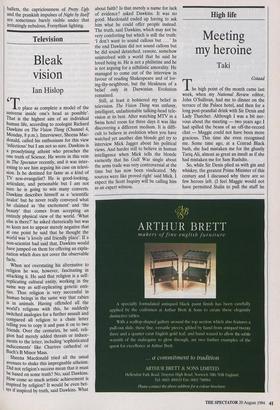Television
Bleak
• •
vision
Ian Hislop
To place as complete a model of the universe inside one's head as possible'. That is the highest aim of an individual human life, according to zoologist Richard Dawlcins on The Vision Thing (Channel 4, Monday, 8 p.m.). Interviewer, Sheena Mac- donald, called his enthusiasm for this view `infectious' but I am not so sure. Dawkins is a proselytising atheist who preaches the one truth of Science. He wrote in this vein in The Spectator recently, and it was inter- esting to see him arguing his case on televi- sion. Is he destined for fame as a kind of TV non-evangelist? He is good-looking, articulate, and personable but I am not sure he is going to win many converts. Dawkins describes himself as a 'scientific zealot' but he never really conveyed what he claimed as `the excitement' and `the beauty' that comes from accepting an entirely physical view of the world. 'What else is there?' he asked rhetorically but was so keen not to appear merely negative that at one point he said that he thought the world was `a lovely and friendly place'. If a non-scientist had said that, Dawkins would have jumped on them for offering an expla- nation which does not cover the observable facts.
When not overstating his alternative to religion he was, however, fascinating in attacking it. He said that religion is a self- replicating cultural entity, working in the same way as self-replicating genetic enti- ties. Thus religion is very successful in human beings in the same way that rabies is in animals. Having offended all the world's religions with this, he suddenly switched analogies for a further assault and compared all religion to a chain letter telling you to copy it and pass it on to two friends. Over the centuries, he said, reli- gion had merely added threats or induce- ments to the letter, including `sophisticated inducements' like Chartres cathedral or Bach's B Minor Mass.
Sheena Macdonald tried all the usual avenues to shake this impregnable atheism. Did not religion's success mean that it must be based on some truth? No, said Dawkins. How come so much artistic achievement is inspired by religion? It would be even bet- ter if inspired by truth, said Dawkins. What about faith? Is that merely a name for lack of evidence? asked Dawkins. It was no good. Macdonald ended up having to ask him what he could offer people instead. The truth, said Dawkins, which may not be very comforting but which is still the truth: `I don't want to sound callous but ... ' In the end Dawkins did not sound callous but he did sound detatched, remote, somehow uninvolved with a world that he said he loved being in. He is not a philistine and he is not arguing for a nilhilistic amorality. He managed to come out of the interview in favour of reading Shakespeare and of lov- ing-thy-neighbour, but the bleakness of a belief only in Darwinian Evolution remained.
Still, at least it bolstered my belief in television. The Vision Thing was unfussy, intelligent, unfashionable talking-head tele- vision at its best. After watching MTV in a Swiss hotel room for three days it was like discovering a different medium. It is diffi- cult to believe in evolution when you have watched yet another dim blonde girl try to interview Mick Jagger about his political views. And harder still to believe in human intelligence when Mick tells the blonde earnestly that his Gulf War single about the arms trade was very controversial at the time but has now been vindicated. `My sources were like proved right' said Mick. I expect the Scott Inquiry will be calling him as an expert witness.


















































 Previous page
Previous page